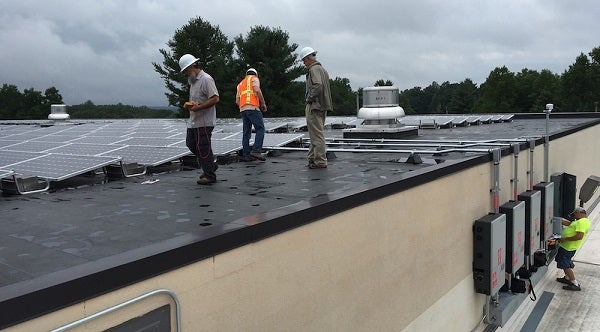Group seeks to help grow solar with PACE financing

Property Assessed Clean Energy (PACE) financing enables homeowners or commercial building owners to finance energy improvements, like solar, through their property taxes. PACE programs connect building owners with capital providers offering long-term, low-cost financing for energy upgrades. PACE financing covers a range of energy projects, from rooftop solar to energy efficiency, and is repaid overtime through property taxes. This means it requires no upfront money out of pocket from building owners. Because project repayment occurs through the property tax, it is transferrable from one building owner to the next. Additionally, longer term repayment schedules can result in lower monthly payments. Streamlining PACE programs can unlock the potential of building owners to install solar.
In Virginia, this is where the Metropolitan Area PACE Alliance (MAPA) comes in. The group recently hosted the first in a series of webinars to promote PACE financing programs across the region. Designed to streamline the adoption of PACE programming, MAPA launched in January 2017. It is made up of a diverse coalition of municipalities, PACE program administrators, and stakeholders from D.C., Maryland, and Virginia. The organization coordinates resources across local jurisdictions so that the various PACE programs can efficiently work together. MAPA hopes to create a “thoughtful, standardized program approach that is easily adopted by interested jurisdictions”. This will simplify the process that property owners use to benefit from PACE projects.
Commercial PACE programs almost ready in Virginia
During the webinar, presenters from PACE-related agencies and organizations in Virginia, Maryland, and D.C. provided an overview of the status of PACE programs in their respective localities. All three have already passed enabling PACE legislation, albeit only for commercial PACE projects. This means that only commercial, industrial, non-profit, and multi-unit buildings are eligible for PACE financing. Since Virginia passed its enabling legislation in 2009, no municipality has opened a PACE program, though Arlington County is in the final stages of implementing the state’s first program, which VA SUN documented in an earlier article.
PACE interest grows across Virginia
According to the webinar, Richmond, Norfolk, Charlottesville, Fredericksburg, Hampton Roads, and Roanoke are also pursuing PACE implementation, though they are not as far along as is Arlington. Maryland may prove to be a model for Virginia to follow. Maryland’s Commercial PACE legislation was enacted in 2014. Since then, twelve municipalities have implemented programs for businesses. Allegany, Anne Arundel, Baltimore, Baltimore City, Charles, Frederick, Garrett, Harford, Howard, Kent, and Queen Anne’s counties have all opted into the MD-PACE program, a statewide program administered by PACE Financial Servicing.
“The start of PACE programs in Maryland offers an opportunity to share lessons learned and build capacity for more PACE in the region,” said Corey Ramsden, MD SUN Program Director.
Montgomery County offers its own program apart from MD-PACE. Washington, D.C. administers its commercial PACE program in collaboration with Urban Ingenuity.
For more information on state-specific PACE programming in the metropolitan D.C. area – and to watch a recorded version of the June webinar – visit the Metropolitan Area PACE Alliance website.
